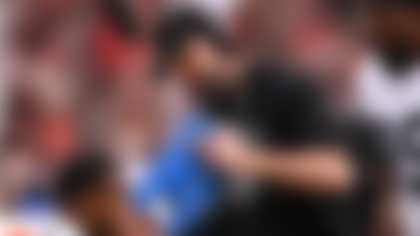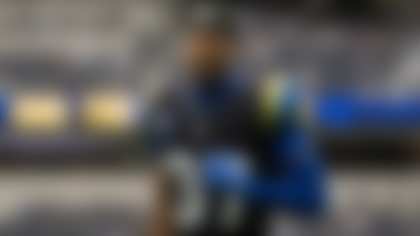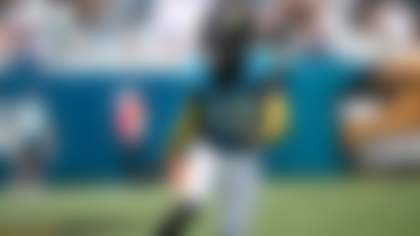I remember the NFL's last work stoppage, in 1987, as being both comical and sad.
It was mostly sad, because, well, a strike had been called and there were predictions it would be a long one with the NFL Players Association demanding free agency and owners steadfast in their refusal to provide it.
But I do recall having a few laughs while covering my second NFL labor dispute on the Bills beat for The Buffalo News.
Some were generated by the gallows humor that helped players, coaches, front-office executives and even reporters get through all of the tension and hard feelings that were tied to the strike being called after the second week of the season. For instance, on the Tuesday that players throughout the league cleared out their lockers without knowing when they'd be back, future Hall of Famer Jim Kelly, who stood to lose about $70,000 per week, climbed into a shiny gold Corvette and said, "I might be driving a Volkswagen later."
Q&A: What's next for both sides?
Now that DeMaurice Smith's NFL Players Association has decertified, NFL Network legal analyst Gabe Feldman breaks down the labor possibilities for both sides. **More...**
Most of the comedy, though, came from the league's decision to resume the season with replacement players.
Like most NFL teams, the Bills, realizing the fallacy of the plan even though the games would count, were something less than thorough in their search for players who would come to be known as "Counterfeit Bills." There were bartenders and construction workers who suddenly had the "opportunity of a lifetime" to play in the NFL. And they did so without having to go through a training camp or any sort of formal tryout. All it took to receive a uniform and helmet was to sign on the dotted line. The team tried its best to keep their identities a secret to protect them from any potential physical harm from the strikers. Besides, it wasn't as if the public was going to be motivated to buy tickets for games with Willie Totten at quarterback, Johnny Shepherd at running back and Thad McFadden at wide receiver.
Of course, there were some "real" players who chose to ignore the strike and join the "scabs," as they were known by those who were striking. Among the notable names that crossed NFL picket lines were Cowboys future Hall of Famer Randy White and the Jets' Mark Gastineau. The Bills were among the teams whose most prominent players stayed out -- even ones like Kelly, who like many of his peers at the time didn't think free agency was worth striking over -- because of the desire to maintain as much unity as possible to help prevent a fracture within the ranks after the work stoppage.
As the "Counterfeit Bills" arrived in Buffalo, about 20 striking Bills players decided to give them a not-so-warm greeting at a local motel where most were being housed. A large black Labrador that belonged to Bills punter John Kidd was used to scare some of the replacements, even though the dog was as docile as could be. Some stern warnings were made, but none of the tough talk amounted to anything and the striking players left without incident.
The next morning, the new Bills gathered for their first voluntary, non-contact practice at the University at Buffalo. Attendance was good and the workout seemed reasonably well organized. It certainly looked a whole lot better than any of the few, sparsely attended sessions held during the 1982 strike. My lasting image from that 57-day nightmare was of Bills guard Reggie McKenzie, with a baseball cap on backwards, chomping on a cigar as he got down in a three-point stance.
Soon after that practice, the striking players headed to the foot of One Bills Drive to greet the replacements on their first day of work at what was then known as Rich Stadium. Four days later, another "welcoming committee" formed in the same spot, and this time the picketers managed to force a chartered bus carrying the replacements to temporarily stop as they pelted it with eggs. That was the first serving of what would become known as "Greyhound Omelets."
The "Counterfeit Bills" lost their first game to the Colts, 47-6, mainly because veteran quarterback Gary Hogeboom defied the strike and was able to throw five touchdowns against a defense that made him look like Johnny Unitas in his prime. Attendance at Rich Stadium was generously reported at 9,860, second-smallest in team history.
After suffering a 14-7 loss at New England a week later, the "Counterfeit Bills" returned home for what would be their final game. It was played despite the fact that a settlement had been reached, although not in time to call off a third week of replacement contests. Despite a 24-day strike, the NFLPA did not get free agency. That wouldn't come until years later.
Buffalo's replacements went out with a 6-3 overtime win against the Giants that was even comically sloppier than the games in the "The Replacements," the movie the '87 strike inspired. The outcome was a surprise, if only because the Giants had by far the best player on the field in linebacker Lawrence Taylor, who had crossed the picket line. Taylor finished with 2.0 sacks and numerous pressures even though he was constantly being held, and often tackled, by center Will Grant.
At halftime, coach Marv Levy approached Grant and said, "Will, what in the world is going on out there? You have been called for holding six times in just one half!"
"Hey, Coach, that's really good," Grant said. "Because I've been holding him every down."
Possible risk of taking Newton
I continue to hear the Bills' interest in Cam Newton is growing, and the quarterback did plenty during his workout at Auburn last week to convince the team's brain trust to give strong consideration to selecting him with the No. 3 overall pick.
However, the potentially large drawback to the Bills or any team selecting Newton with a high pick is that they could very well have no time to work with him during the offseason. Considering how much development Newton is likely to need in his conversion from a spread offense quarterback to one who lines up under center, a prolonged lockout would only figure to hurt his progress.
Although a prolonged lockout would prevent all draft picks (plus undrafted rookies) from signing, at some point Newton would get a contract and the Bills or any club that drafts him would have to weigh the potential negative impact on the investment.
There are those who think Missouri quarterback Blaine Gabbert would be a better choice than Newton because he is considered more NFL ready. But the lack of velocity on his throws has to be a concern when he plays in windy conditions. Newton's arm is plenty strong. In fact, he'll often overthrow his receivers, although that is something most league talent evaluators feel can he can correct by adjusting his footwork.
Trying to keep the peace
During the 1987 strike, Bills general manager Bill Polian told me repeatedly that, despite the labor dispute, he wanted the team to maintain the best possible relationship it could with the players who were on strike. For one thing, he knew that eventually they would return to work. For another, he didn't want the time and investment the Bills had poured into those players, and the bonds that had been built along the way, to disappear because of the NFLPA's decision to call a strike.
Lions president Tom Lewand seems to be taking the same approach, which is particularly wise given the promise his team showed at the end of last season and the chances it could very well blossom into a contender next season ... if there is a next season.
"I personally have a lot of respect for the guys in our locker room and what they've done to build our program," Lewand was quoted as saying in Detroit. "That level of respect isn't going to change one bit."
Projection game: Two-round mock
Pat Kirwan has the Broncos using the second overall pick to help their defensive line. Find out who Denver is projected to take in his two-round mock draft. **More ...**
» Wyche: **Broncos will go front four**
Broncos could put it on the line
It has been 14 years since the Broncos used a first-round draft pick on a true defensive lineman (not counting Robert Ayers, a 2009 first-round pick who moved to outside linebacker as a rookie and is now going back to end). Considering the team's desperate need for tackle help, the streak is likely to end next month.
One player who figures to be on the Broncos' short list is Alabama defensive tackle Marcell Dareus, provided he isn't selected by Carolina in the top overall spot. Dareus' considerable size (6-foot-3-plus, 319 pounds) and strength make him ideal for the 4-3 scheme that new coach John Fox plans to implement. Another possibility is Auburn's Nick Fairley, who is 6-4 but considerably lighter at 291 pounds. Fairley has the quickness to be a highly effective inside pass rusher. Still another name on Denver's short list is Clemson end Da'Quan Bowers, who could give the club another outside pass-rushing force to pair with Elvis Dumervil.
Can Barber still cut it?
I'm not getting how Tiki Barber, who turns 36 next month, thinks he has a real opportunity to make a comeback next season. In case he hasn't noticed, the free-agent market (if there ever is any free agency this offseason) is jammed with accomplished veteran running backs who are younger than Barber. The oldest, at 33, is Ricky Williams and the youngest, at 27, are Joseph Addai, Darren Sproles, and DeAngelo Williams.
I realize it would be cool for Barber and his twin brother, cornerback Ronde, to spend a season together in Tampa. But how wise would it be for the rising Buccaneers to go with an aging player who doesn't play special teams and has been out of the game for three years in their backfield?
Follow Vic Carucci on Twitter @viccarucci.



